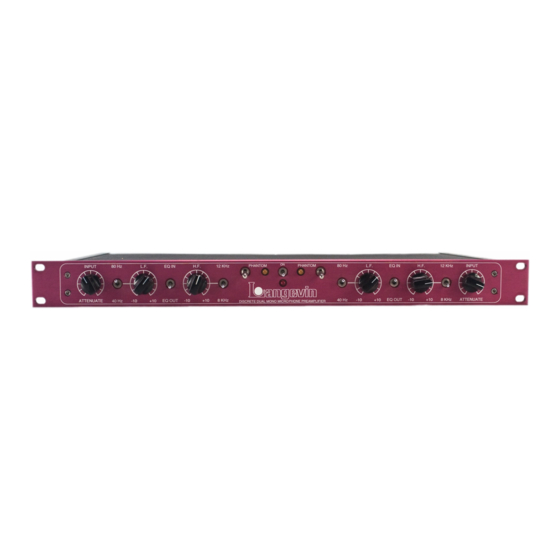Table of Contents
Advertisement
Quick Links
Advertisement
Table of Contents

Summary of Contents for Manley LANGEVIN DUAL
- Page 1 OWNER'S MANUAL LANGEVIN DUAL MONO MICROPHONE PREAMPLIFIER WITH EQ MANLEY LABORATORIES, INC. MANUFACTURED BY: MANLEY LABORATORIES, INC. 13880 MAGNOLIA AVE. CHINO, CA. 91710 USA TEL: (909) 627-4256 FAX: (909) 628-2482 email:emanley@netcom.com http://www.manleylabs.com REV 9-15-2004...
-
Page 2: Table Of Contents
CONTENTS SECTION PAGE INTRODUCTION MAINS CONNECTIONS BASICS CONNECTING YOUR PREAMPLIFIER FRONT PANEL REAR PANEL TECH NOTES SPECIFICATIONS WARRANTY WARRANTY REGISTRATION APPENDIX A: WIRING YOUR OWN CABLES APPENDIX B: TEMPLATE FOR STORING SETTINGS... -
Page 3: Introduction
This Microphone Preamplifier is a low cost way to enjoy good old high-end performance. It is built to the same standards as the Manley gear and uses all of the same top quality components. It is one of the best alternatives for those needing a superb stereo mic pre but for whatever reason cannot get the Manley Tube Mic Preamp. -
Page 4: Mains Connections
MAINS CONNECTIONS Your unit has been factory set to the correct mains voltage for your country. The voltage setting is marked on the serial badge, located on the rear panel. Check that this complies with your local supply. The voltage changeover switch is located inside the unit in the middle of the PCB near the power transformer. -
Page 5: Basics
BASICS This Microphone Preamp, like most mic preamps, is pretty easy to use. First we can discuss why outboard mic pre's have become "a must have item" in almost every studio even though your console probably has a bunch of them and that manufacturer claims that they are really great and you don't need outboard mic pre's. -
Page 6: Connecting Your Preamplifier
CONNECTING YOUR PREAMPLIFIER Easy - Connect the mic to the Microphone Input XLR, then connect the Line Output to your tape machine or console. Read on, there are some things to consider. On the back panel are female XLR's labelled MIC INPUT A and MIC INPUT B. The signal from the MICROPHONES get plugged in here. - Page 7 Reversing the polarity or phase is often needed when two or more mics are picking up the same source. For example it would be needed when one mics the top and bottom of a snare - one skin is going towards one mic and the other skin is going away from the other mic. If one signal is not "reversed"...
-
Page 8: Front Panel
FRONT PANEL PHANTOM 48V POWER PHANTOM 48V INPUT 80 Hz L.F. EQ IN H.F. 12 KHz 80 Hz L.F. EQ IN H.F. 12 KHz INPUT ATTENUATE 40 Hz EQ OUT 8 KHz 40 Hz EQ OUT 8 KHz ATTENUATE DISCRETE DUAL MONO MICROPHONE PREAMPLIFIER C D E F G L M N O P A &... -
Page 9: Rear Panel
REAR PANEL INSTRUMENT INPUT Optimised for Synths and drum machines but not for guitars or basses. Use a regular "DI" into the MIC INPUT for guitars and basses. Use only the instrument input or MIC INPUT but not both at the same time. INPUT XLR (Right Channel) Balanced XLR input. -
Page 10: Tech Notes
TECH NOTES PHANTOM POWER FUSE In earlier sections we explained most of the possible small disasters that can happen when phantom power is used. The big one is damage to other gear not designed for phantom. This includes old ribbon mics, non-pro battery powered mics and possibly other things we have yet to hear about. FOUR reasonable rules: 1) Most modern mics with 3 pin XLR connectors will be safe and there is no need to worry unless you own some exotic or real cheap mics. -
Page 11: Specifications
SPECIFICATIONS Frequency Response 10 Hz to 20 KHz (+/- 1 dB) THD & Noise (1Khz @ +10 dBm) Signal to Noise ratio 103 dB Headroom 27 dB (ref +4 dBv) Maximum Output +31 dBv (75 volts p to p) Maximum Input (with Input at max) 84 mV Maximum Gain (factory set for 45 dB) 38 dB to 53 dB (internal trimmer) -
Page 12: Warranty
Manley Importer for that specific country or region. "Grey Market" purchases are not covered by any warranty. In the case that a Manley Laboratories product must be returned to the factory from outside the USA, customer shall adhere to specific shipping, customs, and commercial... -
Page 13: Warranty Registration
You MUST complete and return the following to validate your warranty and registration. Thank you again for choosing Manley gear and reading all the way through The Owner's Manual. (We really mean that sincerely, the bit about thanking you for choosing our gear. THANK YOU!!!)















Need help?
Do you have a question about the LANGEVIN DUAL and is the answer not in the manual?
Questions and answers